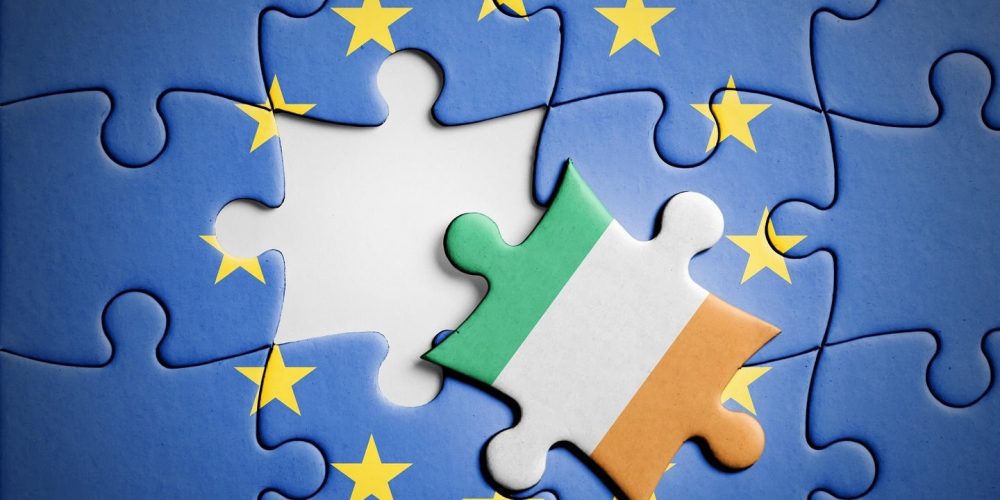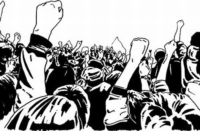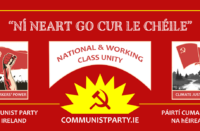A friend asked me recently what this transformative strategy is that the CPI talks about. So I tried to answer.
It is a strategy for advancing the struggle for socialism to replace capitalism. It is not a programme for alleviating the worst aspects of capitalism. It is not a ten-point reform plan. It has to be an evolving thought process and a way of looking at the crisis and formulating demands and struggles.
Firstly, it recognises that capitalism has unsolvable contradictions built in to the system, such as, for example, vast amounts of wealth and vast poverty, or a glut of housing followed by mass homelessness.
These are contradictions that arise from the built-in reproductive cycle of capitalism. They are not an accident, a mistake, the product of corruption, or bad policy. Capitalism reproduces itself through the creation of profit, which by definition requires workers to be paid less than the amount they really make, creating massive inequality.
And capitalism’s driving force is to produce maximum profit, so that if there is a commodity or asset that looks promising, it will be flooded with capital—like housing—creating a bubble, which ultimately bursts.
Secondly, workers are the agents of social change, because of the strategic position they occupy within capitalism. Great change does and will come about through working-class struggle. This is sometimes for a direct and immediate goal of self-interest and at other times for broader, long-term, more political goals. Workers constitute the class that is both exploited directly by capital and also strategically positioned within capitalism to disrupt its reproduction. Capital is dependent on workers.
Of course within the working class there are differences, like gender, ethnicity, sexual orientation, etc., and all of these come with their own specific points of discrimination, depending on the legal and political structure capitalism has taken in a particular country. But it is exploitation, rather than discrimination, that is the crucial point of conflict and the defining antagonism within capitalism. It is this conflict that must be understood and harnessed for socialism to win over capitalism.
This strategy has to be related to the specific and current nature of capitalism in the region where it is applied. Here in Ireland our capitalism is of a neo-colonial nature, not that of a mature developed capitalist state. We exist between the domination of the European Union, the United States, and Britain. Our local ruling class are too weak to rule alone and so are intrinsically tied and allied to foreign interests.
Just look at how the Irish state reacted to the Apple ruling, or the alleged Russian spy affair. These examples demonstrate our lack of a national independent interest but also the complex contradictions between our position within the EU and our domination by both the United States and Britain.
Fundamental to this strategy is identifying the weak points of capitalism here and putting forward demands that bring about long-term change through the mobilising of working people and in so doing affecting the balance of power between labour and capital in a direction favourable to labour. So these are not quick fixes or superficial wins.
Examples of how this strategy plays out in a crisis situation are the mobilisation on water charges, where we have argued for a constitutional referendum to secure the future of publicly financed, publicly owned and publicly provided water, and the housing crisis, where we are arguing for the state to build public housing, to be universally available to all, not just “social housing” for the poor.
These examples may well bring the state into conflict with the EU. The EU has built a neo-liberal constitutional framework around the functioning of capitalism within its member-states. Our strategy will bring the state and working people into conflict with that framework. But that’s fine. Building socialism, by definition, will bring us into conflict with the EU. It’s unavoidable. So rather than hiding or ignoring it we say, Let’s expose the nature of the EU and allow working people to see it for what it is.
We don’t have everything worked out. We don’t have every policy position put through this transformative strategy. But we are studying and developing this approach to strengthen the struggle for socialism in Ireland. The “left,” so caught up in short-term electoralism, appears to have forgotten the long-term struggle for socialism and the strategies required to win.
We need to stop running round like headless chickens from one crisis to the next and start focusing on a real, tangible transformative strategy for socialism.






